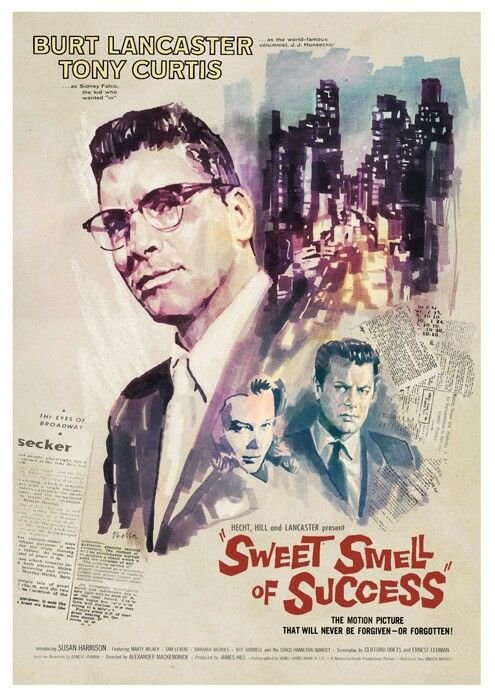‘Sweet Smell of Success’: Are We In a Prison of Our Own Making?
'Don't do anything I wouldn't do! That gives you a lot of leeway…'
Sidney Falco, ‘Sweet Smell of Success.’
I recently re-watched one of my favourite films: Alexander Mackendrick’s 1957 reflection on the New York gossip industry, ‘Sweet Smell of Success.’ Based on a short story by Ernest Lehman, caustically scripted by playwright Clifford Odets, shot in moody black and white by James Wong Howe, and set to a swooning jazz score by Elmer Bernstein, it’s a noir classic.
'Harvey, I often wish I were deaf and wore a hearing aid. With a simple flick of a switch, I could shut out the greedy murmur of little men.’
Burt Lancaster plays J J Hunsecker a tyrannical Broadway columnist for the New York Globe. Bespectacled and elegantly attired, he inhabits the late-night clubs of New York’s Mid-Town, dining with powerful Senators, aspirant stars and unctuous managers. He trades in hearsay and half-truths. He is at once charming and condescending, composed and yet with an air of menace.
'You're dead, son. Get yourself buried.’
Tony Curtis plays Sidney Falco, a Press Agent who earns his modest income by placing stories with columnists like Hunsecker. He is vigorous and smooth talking, with youthful good looks. He’s ‘the boy with the ice cream face.’ But he is also cynical, self-interested and completely lacking in scruples. He will stop at nothing to climb the career ladder.
'J J Hunsecker is the golden ladder to the place I want to get.’
Falco fawns over Hunsecker, who in turn treats him with disdain. Theirs is a relationship of reluctant dependency. The columnist holds his unlit cigarette towards the agent.
'Match me, Sidney.’
The film focuses on Hunsecker’s endeavours to prevent his beloved sister from marrying a jazz musician. (It’s based on the real life columnist Walter Winchell who was similarly protective of his sister.) Hunsecker has commissioned Falco to put an end to the relationship, by any means necessary - so far without success. The columnist is frustrated.
'Sidney, conjugate me a verb. For instance, "to promise.”’
Hunsecker and Falco emerge from the Twenty One Club into the Manhattan night. It’s a bustling world of crowded sidewalks, teeming traffic, crooked cops and gaudy neon. A drunk is thrown brusquely from a nearby nightspot, crashing into a garbage can.
'I love this dirty town.’
Falco pleads for one last chance. He plans to place a smear of the boyfriend in a rival’s gossip column – that way the young couple won’t trace it back to Hunsecker. The piece will suggest that the jazz musician is a communist and a marijuana user.
'The cat's in the bag and the bag's in the river.’
As the plot thickens and the tension ratchets up, Hunsecker offers Falco a candid character assessment.
‘You’re in jail, Sidney. You’re a prisoner of your own fears, your own greed and ambition.’
‘Sweet Smell of Success’ is indeed a tale of ambition, and the damaging effect it has on people. Occasionally we see suggestions that Falco has the residues of a conscience, that he might once have been a decent human being. But his blinkered drive for personal gain, his unquenchable appetite for advancement, has eradicated any qualms and misgivings, any consideration of others.
'I'd hate to take a bite out of you. You're a cookie full of arsenic.’
Now I’m sure none of us could be accused of being quite so amoral as Sidney Falco. But we are all, to varying degrees, driven by ambition. Today ambition is broadly celebrated and encouraged. It’s the urge to get on, to realise our potential, ‘to be the best that we can be.’ It’s a measure of commitment.
But perhaps it’s worth regarding our ambition with a certain amount of circumspection. In historic times this same quality was considered a sin. Ambition is compulsive, corrosive, all consuming. It can eat away at trust and relationships. While driving us upwards and onwards, it can also isolate us.
In time, compromised by excuses, half-truths and neglect, our friends fall away and our colleagues keep their distance. We become our own gaolers, constrained by walls and fetters we have created ourselves. We are in a prison of our own making.
'The best way to keep a prisoner from escaping is to make sure he never knows he's in prison.'
Fyodor Dostoevsky
For a brief moment it seems that Falco’s plans will come to fruition. He withdraws to a bar to celebrate.
'I am tasting my favorite new perfume - success!’
But ultimately his plot is defeated by the integrity of others. As dawn breaks we find him out on Times Square being beaten up by the cops. The lieutenant wipes his hands clean, pigeons flock to the scene and the sound of the brass section swells to a climax.
'Here I am, after so many years,
Hounded by hatred and trapped by fear.
I'm in a box. I've got no place to go.
If I follow my mind, I know I'll slaughter my own.
Help me, I'm the prisoner.
Won't you hear my plea?
I need somebody to listen to me
I beg you, brothers and sisters
I'm counting on you.’
Gil Scott-Heron, ’The Prisoner'
No. 348


